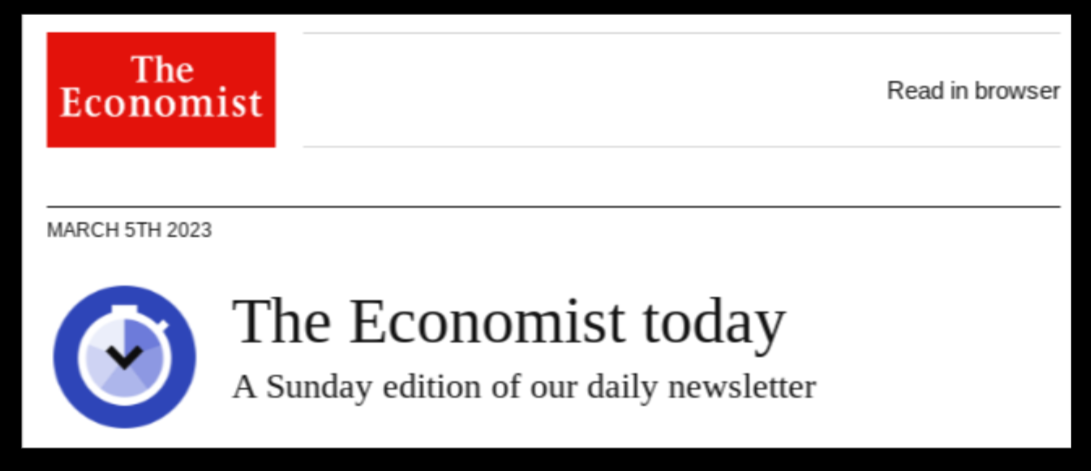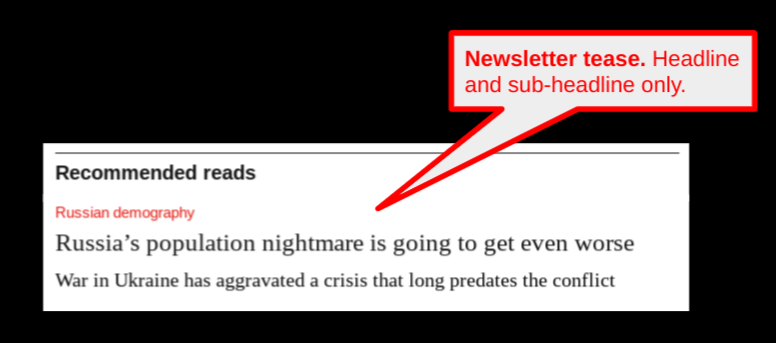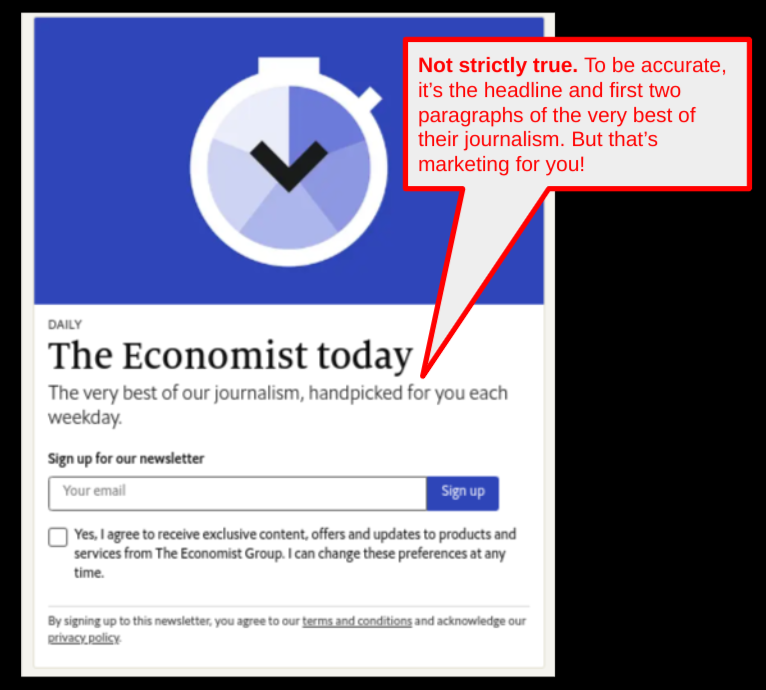CN#15. Being human: A rare but significant personal touch from The Economist
NEWSLETTER DATA
TITLE: The Economist Today (Sunday edition)
FREQUENCY: Every Sunday
TYPE: News, consumer
PURPOSE: Engagement and sales
LAUNCHED: January 2022
SUBSCRIBERS: 1.5 million
WORD COUNT: 769
SENT FROM: Adam Roberts at The Economist
SUBJECT LINE: Russia’s population nightmare is going to get even worse
DESIGN: Clean and businesslike. Sans serif font

Taking a more individual approach
The Sunday version of the free The Economist Today stands out from the weekday editions in that the reader gets to share the thoughts of Digital Editor Adam Roberts.
Just sending the regular taster email from a named individual lifts the newsletter and gives an immediate advantage over the competition. It's the human connection.
I get a lot of newsletters, many from the same title. So when The Times Red Box or The Telegraph Front Page show up, I’m thinking: which one is that again? Who writes it? Is it a voice I value?
When I see the name Adam Roberts, I just think, well, that’s Adam Roberts, I know what to expect, what's he saying today?
That’s not to say The Times and The Telegraph don’t produce excellent content and have huge brand affinity. It's just that seeing the name of a person prioritises the message above everything else that's going on in my inbox. (And believe me, there's a LOT going on).
I should add there are also writers bylined at The Times and The Telegraph, but the emails don't COME from them.
Organisational or commercial reasons may prevent using the name of an author. There may be management hesitancy about promoting a personal brand instead of the title. Who knows, the individual might be about to leave or even get fired.
The Economist solves the conflict so far as it can be solved, by combining the editor’s name and the name of the newsletter.
The real benefits of being personal in terms of engagement come inside, where Adam Roberts gives his take on current stories.
This is where the human connection works so well, inviting the reader to share a professional and emotional involvement in the news. He’s selling stories, helping readers understand the editorial judgements that lie behind them, and giving personal recommendations.
Instead of just samples of the news, you’re getting someone’s insight and explanation. For a busy and information-dazed consumer it's helpful, reassuring, and engaging.
Some “Letter From The Editor” columns do this well, although the majority fail to rise above the level of a glorified contents list.
The overlay of a professional interpretation BEFORE you read the samples makes The Economist Today Sunday edition a supercharged version of the workaday weekday output.
As the intention is to persuade you to take out a free trial subscription, Adam Roberts' personality increases the chances. He takes you by the hand like a friend and advises you to “Try It, I Liked It, and I Know What I’m Talking About”.
Adam's chat is not the end of the newsletter, but rather disappointingly we don't see him again. Next comes the “Recommended reads” section, a repeat of the daily edition's rather mechanical format of headline and sub-headline for 6 articles.
The headlines are interesting and intriguing, but the change of tone from personal to corporate cools the user experience. Links take you to the website, where you’ll see 1 or 2 paragraphs from each article before hitting the paywall.

So looking at the value of being personal, is the Sunday edition more likely to get me to subscribe? Answer: Yes. It's more engaging and persuasive so my guess is that it will garner more click-throughs and conversions.
The Economist will know the answer to this, and I may be wrong, but my gut tells me that this personal approach makes a difference.
Laser focus on recurring subscription revenue
Why does this matter so much? Because higher levels of engagement are critical to the success of The Economist's business model with its emphasis on recurring subscription revenue.
Focusing on this revenue stream has brought its owners 1.2m annual paying subscribers and helped produce an operating profit of £46m ($54m) in 2021.
Maintaining growth is the challenge, which is why the publication is constantly experimenting with new formats, price points and editorial offerings.
It would be no surprise to see a personal approach being rolled out more widely. Named editors now appear at the top of sector specific newsletters for paying subscribers.
The wider question for me as a non-subscribing fence-sitter is this. Am I really test driving the best The Economist has on offer? Answer: No.
Without being hypercritical, my relationship with the publication does start with something of a sleight of hand.

The landing page offers "The very best of our journalism, handpicked for you each weekday" in exchange for my email address. As we've seen, you don't actually get to read the journalism, just the headlines and the first couple of paragraphs.
Why not sometimes share the whole article? To me this is the logical extension of the friendly relationship Adam Roberts is building with me. If we met for a chat regularly in a pub and he talked about the articles he had edited, highlighting the best ones, it would be AUTOMATIC he would share it with me.
The Economist is expensive compared to most other news subs, (£18.90/month for digital and £23.90/month for print + digital).
So the three things that would sway me to part with money would be:
- Adam Roberts (or another named writer) recommending an article on a subject I was really interested in, in a persuasive and authentic way.
- Reading the full article, it was incredibly good and I would would want more.
- Repeating the above.
Yes, make it more personal
The obvious benefits from being more personal and giving more content away nevertheless make some publishers uncomfortable. They're in business after all and holding on to content always worked in the past.
The Economist in particular is having to manage an identity change. Until very recently it presented itself as a monolith with no bylines at all for writers.
That policy gave the content a Ten Commandments feel. Verdicts on global events were handed down from from an imperious editorial machine as the final say on matters (albeit from a single libertarian and free market, perspective.)
Now the requirement for such authority is giving way to the need for engagement and authenticity requiring a more human interface.
Like most publishers who invest in quality, The Economist faces a constant dilemma between on the one hand needing to attract attention and interest, while on the other not giving too much away.
Put another way, to engage and persuade you have to demonstrate and prove the value but if you're too generous it's a disincentive to subscribe.
The bottom line is that ever more intense competition means publishers pursuing growth will HAVE to give away more and better content, lower prices and make more personal connections to establish a commercial relationship.
Adam Roberts should be allowed out to play, and give away more content, every day.
Read The Economist Today Sunday edition here.
Guarantee receiving every issue of Champion Newsletters. Subscribe today and take advantage of the Founder Members offer.
